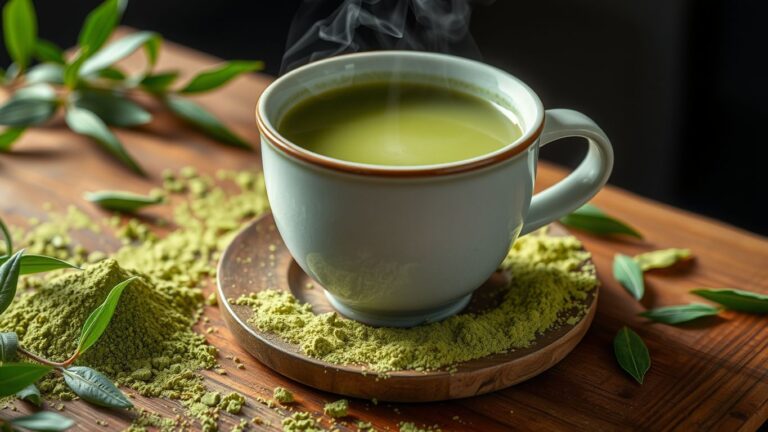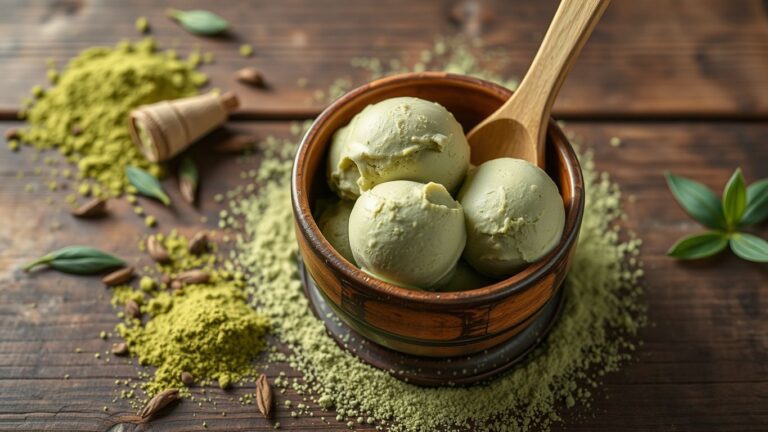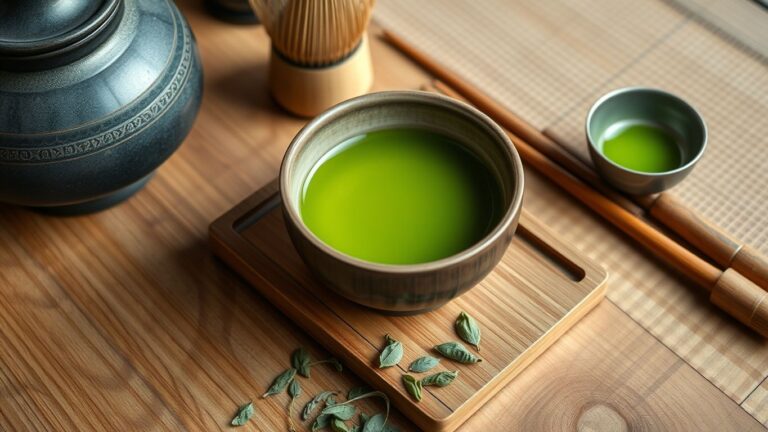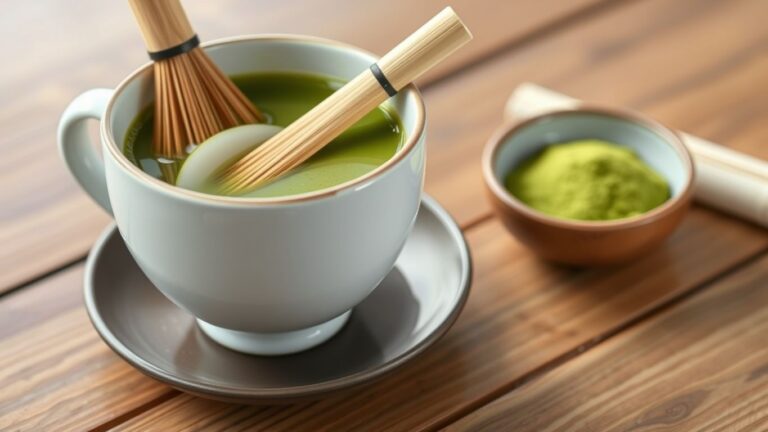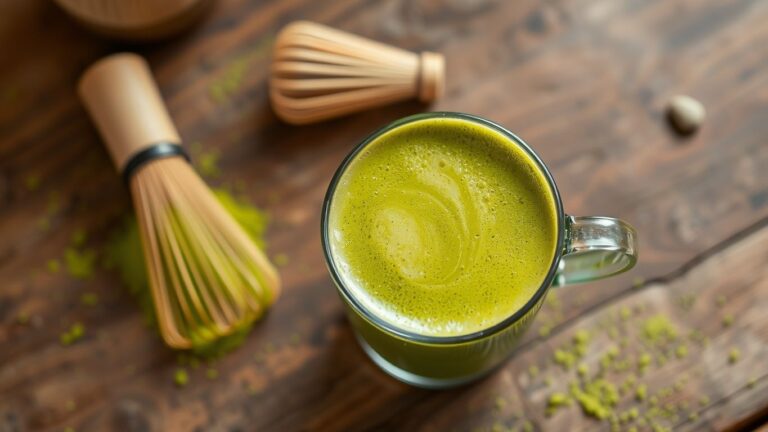Matcha has become a trendy drink, celebrated for its unique flavor and health perks. But, like many good things, too much matcha can be harmful. This article looks at what happens when you drink too much matcha and the possible side effects you might face.
Key Takeaways
- Drinking too much matcha can lead to feeling jittery and anxious because of its high caffeine content.
- Overconsumption of matcha may cause digestive issues like stomach pain, nausea, and diarrhea due to its tannins.
- Matcha can interfere with your sleep cycle, especially if consumed later in the day, potentially causing insomnia.
- High amounts of matcha can strain the liver and kidneys, making it important to drink it in moderation.
- Poor-quality matcha may contain harmful contaminants, so it’s crucial to choose high-quality matcha.
The Caffeine Conundrum: Overstimulation and Jitters
Feeling Overstimulated and Anxious
Drinking too much matcha can make you feel overstimulated and anxious. The high caffeine content in matcha can lead to an overstimulated nervous system, causing you to feel jittery and nervous. This can be especially true if you are sensitive to caffeine.
Increased Heart Rate and Palpitations
Another side effect of consuming too much matcha is an increased heart rate. You might experience heart palpitations, which can be quite alarming. These symptoms are typical of high caffeine intake and can make you feel uncomfortable.
Restlessness and Insomnia
Matcha’s caffeine can also interfere with your sleep. Drinking it later in the day can lead to restlessness and insomnia. It’s best to enjoy your matcha earlier in the day to avoid disrupting your sleep cycle.
Moderation is key when it comes to enjoying matcha. Too much of it can lead to unwanted side effects, so it’s important to find a balance that works for you.
Digestive Distress: Upset Stomach and More

Tannins and Stomach Irritation
Matcha contains tannins, which can cause stomach irritation if consumed on an empty stomach. These tannins can make the stomach more acidic, leading to discomfort, nausea, and even vomiting. To avoid this, it’s best to drink matcha after a meal or with snacks.
Nausea and Abdominal Pain
Drinking too much matcha can lead to nausea and abdominal pain. The caffeine and other compounds in matcha can upset your stomach, especially if you’re not used to caffeinated beverages. If you experience these symptoms, try reducing your intake.
Diarrhea and Constipation
Matcha can also cause digestive issues like diarrhea and constipation. The high levels of catechins in matcha can speed up or slow down your digestive system. If you notice these problems, it might be a sign to cut back on your matcha consumption.
Drinking matcha in moderation and paying attention to how your body reacts can help you enjoy its benefits without the digestive distress.
Impact on Heart Health: Blood Pressure and Beyond
Drinking too much matcha can have a significant impact on your heart health. While matcha is known for its health benefits, overconsumption can lead to some serious issues.
High Blood Pressure Risks
Matcha contains caffeine, which can cause a temporary increase in blood pressure. If you already have high blood pressure, drinking too much matcha might make it worse. It’s important to monitor your intake to avoid any potential risks.
Heart Palpitations Explained
The caffeine in matcha can also lead to heart palpitations. This means your heart might feel like it’s racing or pounding. These palpitations can be uncomfortable and even scary, especially if you are sensitive to caffeine.
Managing Heart Health with Matcha
To enjoy matcha without harming your heart, try to limit your intake. Here are some tips:
- Drink matcha in moderation.
- Avoid drinking matcha late in the day to prevent sleep issues.
- Pay attention to how your body reacts and adjust your consumption accordingly.
Remember, while matcha has many benefits, too much can make you jittery and nervous and mess with your sleep. Always listen to your body and consult with a healthcare professional if you have any concerns.
Sleep Disruption: Matcha and Your Sleep Cycle

Caffeine’s Role in Sleep Interference
Matcha contains caffeine, which can interfere with your sleep if consumed too late in the day. Caffeine can stay in your system for several hours, making it harder to fall asleep and stay asleep. If you’re sensitive to caffeine, even a small amount can keep you awake.
Timing Your Matcha Intake
To avoid sleep disruption, it’s best to enjoy matcha earlier in the day. Drinking matcha in the morning or early afternoon can give you an energy boost without affecting your nighttime rest. Steer clear of drinking matcha late in the evening to ensure a restful night’s sleep.
Tips for Better Sleep
- Limit matcha consumption to the morning or early afternoon.
- Pay attention to how your body reacts to caffeine and adjust your intake accordingly.
- Create a relaxing bedtime routine to help you wind down.
Remember, the choice of when to enjoy matcha ultimately depends on your individual routines and preferences. If you experience unpleasant side effects, consider reducing the amount you consume.
Anxiety Amplification: When Relaxation Turns to Stress
Understanding L-Theanine and Caffeine
Matcha is known for its relaxing and calming effects due to the presence of L-theanine, an amino acid that promotes relaxation without causing drowsiness. However, the caffeine in matcha can sometimes counteract these benefits, especially if you consume too much. The combination of L-theanine and caffeine is meant to provide a balanced energy boost, but in high amounts, it can lead to feelings of overstimulation and anxiety.
Symptoms of Matcha-Induced Anxiety
When you drink too much matcha, you might experience symptoms similar to those caused by other caffeinated beverages. These can include:
- Feeling jittery or nervous
- Increased heart rate
- Restlessness
- Difficulty concentrating
These symptoms can be particularly pronounced in individuals who are sensitive to caffeine or who consume matcha in large quantities.
Managing Anxiety with Matcha
To enjoy the benefits of matcha without the anxiety, consider the following tips:
- Moderation is key: Limit your intake to avoid overstimulation.
- Timing matters: Avoid drinking matcha late in the day to prevent sleep disturbances.
- Stay hydrated: Drink plenty of water to help balance the diuretic effects of matcha.
- Listen to your body: Pay attention to how you feel after drinking matcha and adjust your consumption accordingly.
Remember, while matcha can enhance your mental clarity and may reduce anxiety, it’s important to consume it mindfully to avoid potential side effects.
Dehydration Dilemma: The Diuretic Effect of Matcha

Drinking matcha can be a delightful experience, but it’s important to be aware of its potential side effects. One such effect is dehydration, which can occur due to matcha’s diuretic properties. Understanding how matcha affects your hydration levels is crucial for enjoying this beverage responsibly.
Liver and Kidney Concerns: Processing Excess Matcha
How Matcha Affects Liver Function
Drinking too much matcha can put a strain on your liver. While matcha is generally safe, excessive consumption can lead to liver issues. The compound EGCG in matcha, when taken in large amounts, may cause liver damage. It’s important to enjoy matcha in moderation to avoid these risks.
Kidney Strain and Detoxification
Your kidneys naturally cleanse your body by filtering waste from your blood. However, consuming too much matcha can make this process harder. The high levels of certain compounds in matcha can strain your kidneys, making it difficult for them to detoxify your body effectively. Staying hydrated and not overdoing your matcha intake can help support your kidneys.
Safe Consumption Levels
To keep your liver and kidneys healthy, it’s crucial to stick to safe consumption levels. Experts recommend not exceeding more than 2-3 cups of matcha per day. This ensures you get the benefits without overloading your organs. If you have existing liver or kidney conditions, consult your doctor before adding matcha to your diet.
Bone Health: Calcium Absorption Issues
Matcha and Calcium Absorption
Drinking too much matcha can affect how your body absorbs calcium. This is because matcha contains compounds that can limit the absorption of calcium in your bloodstream. If you rely on matcha for your daily caffeine fix, you might want to consider how it impacts your calcium levels.
Potential for Weakened Bones
When your body doesn’t get enough calcium, your bones can become weaker over time. This can lead to conditions like osteoporosis, where bones become fragile and more likely to break. It’s important to balance your matcha intake with other sources of calcium to keep your bones strong.
Balancing Matcha with a Calcium-Rich Diet
To enjoy matcha without compromising your bone health, try to include plenty of calcium-rich foods in your diet. Here are some tips:
- Eat more dairy products like milk, cheese, and yogurt.
- Include leafy green vegetables such as kale and spinach.
- Consider calcium-fortified foods like orange juice and cereals.
Remember, while matcha has many benefits, it’s crucial to consume it in moderation to avoid potential side effects like weakened bones.
Dental Health: Staining and Other Concerns
Matcha’s Impact on Teeth Color
Matcha, like many teas, contains tannins. These plant compounds can stick to your tooth enamel, causing discoloration over time. If you drink matcha regularly, you might notice your teeth taking on a greenish tint. Popular Japanese tea protects your gums and teeth, but it can also leave a mark on your smile.
Preventing Dental Discoloration
To keep your teeth white while enjoying matcha, consider these tips:
- Rinse your mouth with water after drinking matcha.
- Brush your teeth about 30 minutes after consuming matcha to avoid enamel damage.
- Use a straw to minimize contact between matcha and your teeth.
- Visit your dentist regularly for professional cleanings.
Oral Hygiene Tips for Matcha Drinkers
Maintaining good oral hygiene is crucial if you’re a matcha fan. Here are some tips:
- Brush twice a day with fluoride toothpaste.
- Floss daily to remove plaque between teeth.
- Consider using a whitening toothpaste to combat stains.
- Schedule regular dental check-ups to monitor your oral health.
While matcha offers many health benefits, it’s essential to balance your intake with proper dental care to keep your smile bright and healthy.
Quality Matters: Risks of Low-Quality Matcha

Identifying High-Quality Matcha
When choosing matcha, it’s crucial to look for vibrant green color and a slightly sweet aroma. High-quality matcha is usually made from the youngest tea leaves, which are ground into a fine powder. If your matcha tastes bitter or lacks color, it might be of lower quality.
Potential Contaminants in Poor-Quality Matcha
Low-quality matcha can contain harmful substances like fluoride, lead, or arsenic. These contaminants are absorbed by the green tea plant during the growing process. Symptoms of arsenic poisoning include muscle cramps, nausea, and an irregular heartbeat.
Health Risks of Contaminated Matcha
Consuming matcha with contaminants can lead to serious health issues. You might experience headaches, an upset stomach, or even diarrhea. It’s essential to choose matcha that is tested for purity to avoid these risks.
Always opt for organic matcha that is screened for toxins and heavy metals to ensure you’re getting the safest product.
By being cautious and selecting high-quality matcha, you can enjoy its benefits without worrying about potential side effects.
Weight Gain Worries: Hidden Calories in Matcha Treats
Caloric Content of Matcha Beverages
When you think of matcha, you might picture a healthy, green drink. However, matcha beverages can be surprisingly high in calories. This is especially true for matcha lattes and other sweetened drinks. A simple matcha tea has minimal calories, but once you add milk, sweeteners, or syrups, the calorie count can skyrocket.
Impact of Sweeteners and Additives
Sweeteners and additives are often used to enhance the flavor of matcha drinks. While they make the drink more enjoyable, they also add extra calories. For instance, a matcha latte with whole milk and sugar can contain as many calories as a small meal. Be mindful of what you add to your matcha to avoid unwanted weight gain.
Healthy Matcha Consumption Tips
To enjoy matcha without the extra calories, consider these tips:
- Opt for unsweetened matcha: Skip the sugar and syrups.
- Use low-fat or plant-based milk: These options are lower in calories than whole milk.
- Watch your portion sizes: Stick to a single serving to keep calorie intake in check.
Remember, while matcha has many health benefits, it’s important to be aware of the hidden calories in your favorite matcha treats. Enjoy matcha in moderation to make the most of its health benefits without the extra calories.
Conclusion
In conclusion, while matcha offers numerous health benefits, it’s important to enjoy it in moderation. Drinking too much matcha can lead to a variety of side effects, such as jitteriness, digestive issues, and trouble sleeping. The key is to listen to your body and adjust your intake accordingly. By doing so, you can continue to enjoy the unique flavor and health perks of matcha without any of the downsides. Remember, balance is the secret to making the most of this vibrant green tea.
Frequently Asked Questions
What happens if you drink too much matcha?
Drinking too much matcha can lead to consuming a lot of caffeine, which might make you feel jittery, anxious, or overly energized. It can also cause an increased heart rate, high blood pressure, and restlessness.
How much matcha is too much?
The amount varies for each person, but generally, more than two cups a day can lead to unwanted side effects, especially if you are sensitive to caffeine.
Can matcha upset your stomach?
Yes, drinking too much matcha can cause stomach discomfort because it contains tannins, which might irritate your stomach lining and cause nausea or abdominal pain.
Does matcha affect sleep?
Yes, the caffeine in matcha can interfere with your sleep if you drink it too late in the day. It’s best to enjoy matcha earlier in the day to avoid sleep disruptions.
Can matcha cause dehydration?
Since matcha is a natural diuretic, it can make you urinate more, which might lead to dehydration if you don’t drink enough water.
Is matcha safe for your liver and kidneys?
In moderation, matcha is safe, but drinking it in large amounts can strain your liver and kidneys as they work to process the excess substances.
Does matcha stain your teeth?
Yes, the natural green color of matcha can stain your teeth over time. Maintaining good oral hygiene can help prevent this.
Can low-quality matcha be harmful?
Yes, low-quality matcha might contain contaminants like lead or arsenic, which can be harmful. It’s important to choose high-quality matcha to avoid these risks.


